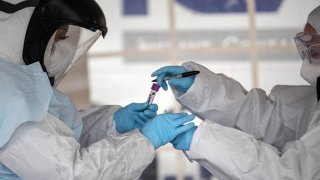
Illinois reported the first case of the South African COVID-19 variant Thursday, health officials announced.
The Illinois Department of Public Health said the first case of the coronavirus variant B.1.351, first identified in South Africa, has been found in the state.
The confirmed variant was located in a Rock Island resident, the Centers for Disease Control and Prevention reported.
“We expected to see more cases of variants detected in Illinois, including the B.1.351 strain,” said IDPH Director Dr. Ngozi Ezike. “These variants seem to spread more rapidly, which can lead to more cases of COVID-19 and even another surge. Our best path to defeating this virus as quickly as possible remains wearing our masks and getting vaccinated when it’s our turn.”
In the U.S., cases of the B.1.351 were first reported at the end of January, health officials said. Studies suggest the antibodies produced through the current COVID-19 vaccines recognize the variant, as well as offer "some protection."
"IDPH will continue to work with local health departments, academic partners, laboratories, and CDC to monitor for cases. IDPH has increased its surveillance for this and other variants using genomic sequence testing on an increased number of specimens," a release said.
The Lake County Health Department reported the first case of the coronavirus variant B.1.1.7 last week, which is the strain more commonly circulating the U.K. in recent months.
Local
The individual infected with the variant had traveled internationally and was in contact with a sick person before leaving to return back to the U.S. in late December, health officials said.
According to the department, the individual did not experience any symptoms of the coronavirus.
“We expect to see more cases of these new variants in Lake County as they seem to spread more easily and quickly than other variants,” Dr. Sana Ahmed, Medical Epidemiologist for LCHD, said. “It is extremely important that you follow quarantine recommendations and get tested if you have traveled or have been in close contact with someone who has tested positive for COVID-19."
Health officials reminded that studies suggest the currently available COVID-19 vaccine is effective against the new strains.
In Illinois, the first known case of the more contagious strain was announced by health officials on Friday, Jan. 15.
A Chicago Department of Public Health investigation found that the individual had traveled to the U.K. and the Middle East in the 14 days prior to diagnosis, officials said, noting that the department had worked to identify the person's close contacts to alert them to quarantine and isolate.
While much remains uncertain about the new COVID-19 variant first discovered in the United Kingdom, Illinois' top doctor said Friday that enough is known, so people are able to take the proper precautions.
"...If something is more transmissible, that would suggest that we need to double down on mask wearing," Ezike said, as she also stressed social distancing and handwashing. "Like all those things we've been saying...the message doesn't really change, it just means it's now more important than ever before to adhere to them [mitigations]."
A U.K. scientist revealed some evidence suggests the strain carries a higher risk of death than the original strain, although he cautioned that the data is uncertain.
Patrick Vallance, the British government's chief scientific adviser said that for a man in his 60s with the original version of the virus, “the average risk is that for 1,000 people who got infected, roughly 10 would be expected to unfortunately die.”
“With the new variant, for 1,000 people infected, roughly 13 or 14 people might be expected to die,” he said.
At a coronavirus news briefing, both Ezike and Illinois Gov. J.B. Pritzker said mitigations could be increased throughout the state if there are widespread reports of the new variant.
"If we do see an a surge in terms of the U.K. variant, we know that it starts to multiply very quickly, once it takes a significant hold," Ezike said. "We know the numbers now are very, very low. But that can change..."
The British variant was first detected in September, World Health Organization officials previously announced. Since then, cases have skyrocketed across the U.K., resulting in Prime Minister Boris Johnson's decision to impose a national lockdown.
The U.K. variant is one of two new contagious viral strains that have recently emerged, the CDC said in a telebriefing late last month.



